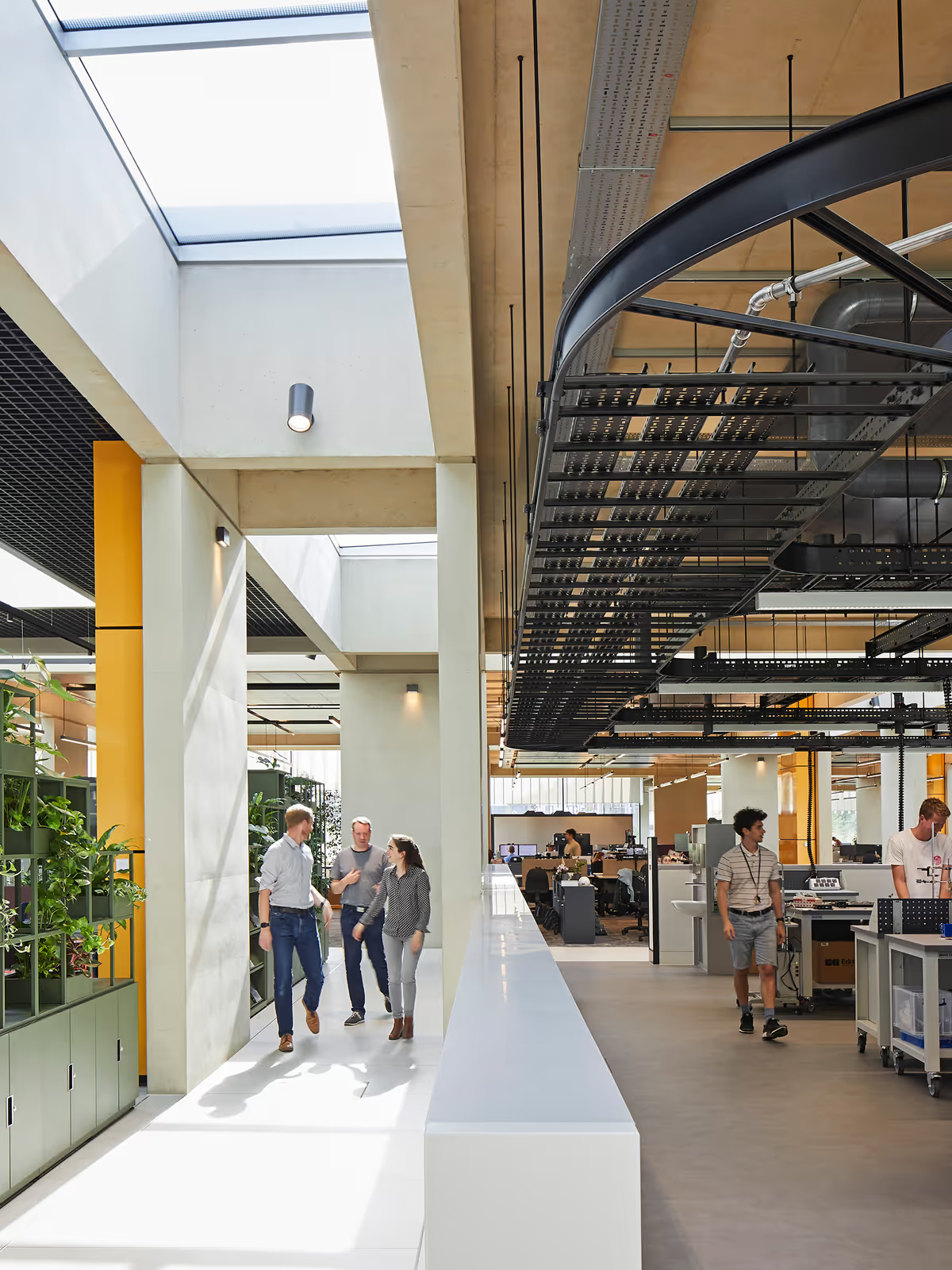
Industrial sustainability
Developing market-leading solutions for industry.
Industrial processes and products are being transformed by technological advancements and in response to environmental and regulatory pressures. There are great opportunities for innovators to respond by delivering higher efficiency and cleaner operations, offering greater process insight and control. TTP can bring expertise to clients to address the challenges of energy efficiency, waste reduction, process monitoring and control.


Balancing sustainability with business growth
Sustainability is a factor driving all industries, whether in reducing scope 1 emissions, minimising water use, adopting a circular economy or switching to renewable sources of energy or input materials, the need for change is an imperative for most major corporations.
We recognise that whilst clients need to respond to these ESG drivers they also need to deliver annual returns for their investors. Prioritising R&D spend needs to balance sustaining existing product offerings with investing for the future; TTP is able to help clients address the near term and the longer term, to reduce costs and to innovate.
Our services encompass work in the energy transition (see our power-to-x page to learn more) and industrial sustainability as defined below.


The new gas conditioning units were tested and certified as ready for trials on the UK gas network by TTP and delivered to Cadent in 2018.
Consultant
TTP


Working with TTP was a pleasure and a very good fit for Philips Respironics. They were able to provide us with novel sensing technology that created a significant cost improvement over existing options. While we traditionally did not develop new sensors like this, TTP was able to lead us through the process very effectively and within budget.”
Peter Bliss
Principal Engineer at Philips Respironics


Industrial processes
Industrial processes are complex and capital intensive, incorporating thermal, fluidic and mechanical interfaces, requiring high levels of control. Sustainability often comes down to reducing inputs, minimising waste and maintaining yields. Industrial scale processes have been heavily optimised, so making further marginal gains is not easy. In some sectors, batch processes are being transformed into continuous ones. TTP can bring a 3rd party perspective to process engineering, whether through advances in process modelling or offering new sensor modalities, we can often find a new route forward that was previously difficult to identify.


Industrial products
Industrial products typically need to be able to meet stringent performance, quality and safety standards, whilst opportunities for economies of scale are limited. Sustaining innovation is often needed to keep products relevant and competitive, whilst their long product lifecycles can make them susceptible to component obsolescence risks. We can help our clients take advantage of advances in the enabling technologies or optimise the methods of production. Our experience in developing new products draws on decades of experience including in areas such as ATEX, that allows us to strike the right balance of time to market, cost and quality.
How we can help
End-to-end innovation
TTP partners with clients across every stage of the innovation cycle, from conception to commercialisation. Our work embraces all aspects of new product or process engineering, from techno-economic analysis, design and process modelling, to detailed design, DFMA, prototype manufacture through to validation and testing.

Innovating for products and processes
We have a long track record of innovation to create value for clients, frequently delivering sustainability benefits along the way while integrating technical advancement, such as in the application of digitalisation and AI.
For example, amid a push by regulators to reduce leakages across the UK gas network, TTP worked with gas distribution company Cadent to develop new gas conditioning equipment. We began by modelling the system; used insights from the model to develop a product to help seal joints in older gas pipes; and tested and certified it against the relevant standards. Read the full case study here.

Deposition and droplets
We havedeep expertise in precision droplet engineering, offering high transfer efficiency material deposition, including coatings for difficult and non-standard materials. Our technologies have been patented and commercialised for use in a wide range of applications including spray drying, industrial coating, automotive and aerospace paint applications, and in other sectors including drug delivery and medical products.

Novel sensors
TTP develops novel sensors for industrial applications where existing commercial sensors can’t meet the functionality or performance, from refrigerant leak detection, gas purity measurement to impulse radar sensors.
TTP partnered with Philips Respironics, leaders in portable oxygen concentrators, to develop a more efficient sensor to measure the purity of the oxygen delivered to patients. Read the case study here.

Supporting the techno-economic case for innovation
We carry out techno-economic and market landscaping analyses to help our clients make well-informed make or buy investment decisions, using the outputs to help clients figure out where they have a right to play and what they need to invest in to succeed.

Problem solving and optimisation
Problem solving requires a combination of critical and creative thinking. TTP’s team of scientist and engineers can apply themselves to all manner of engineering challenges, from devices operating at micron scale through to evaluating new industrial processes. We work closely with our clients to allow them to directly engage in the innovation process.

Utilising modelling to enable new approaches
Industrial processes often take place in complex, hazardous, or extreme environments for which conventional measurement solutions are not always viable. TTP experts use computational models to gain insight into process sensitivities and developing their scaling laws, as well as helping to identify new sensing techniques.

To reduce process waste
The economic viability of industrial production can depend on maximising the output while minimising wastage of high value materials or resources expended in processes.
TTP has experience of helping clients achieve their process goals from using high transfer efficiency deposition methods for sustainable coatings and catalysts or to change processes to reduce energy or water consumption without compromising on yield or quality.

Support the transition to electrification
Building new infrastructure to support renewable energy sources and the storage and production of green ammonia and hydrogen requires new process solutions and approaches to manufacturing. TTP’s expertise across the sustainable industrial, power electronics and green energy sectors means we are ideally placed to provide solutions in this fast-growing sector.

End-to-end innovation
TTP partners with clients across every stage of the innovation cycle, from conception to commercialisation. Our work embraces all aspects of new product or process engineering, from techno-economic analysis, design and process modelling, to detailed design, DFMA, prototype manufacture through to validation and testing.

Innovating for products and processes
We have a long track record of innovation to create value for clients, frequently delivering sustainability benefits along the way while integrating technical advancement, such as in the application of digitalisation and AI.
For example, amid a push by regulators to reduce leakages across the UK gas network, TTP worked with gas distribution company Cadent to develop new gas conditioning equipment. We began by modelling the system; used insights from the model to develop a product to help seal joints in older gas pipes; and tested and certified it against the relevant standards. Read the full case study here.

Deposition and droplets
We havedeep expertise in precision droplet engineering, offering high transfer efficiency material deposition, including coatings for difficult and non-standard materials. Our technologies have been patented and commercialised for use in a wide range of applications including spray drying, industrial coating, automotive and aerospace paint applications, and in other sectors including drug delivery and medical products.

Novel sensors
TTP develops novel sensors for industrial applications where existing commercial sensors can’t meet the functionality or performance, from refrigerant leak detection, gas purity measurement to impulse radar sensors.
TTP partnered with Philips Respironics, leaders in portable oxygen concentrators, to develop a more efficient sensor to measure the purity of the oxygen delivered to patients. Read the case study here.

Supporting the techno-economic case for innovation
We carry out techno-economic and market landscaping analyses to help our clients make well-informed make or buy investment decisions, using the outputs to help clients figure out where they have a right to play and what they need to invest in to succeed.

Problem solving and optimisation
Problem solving requires a combination of critical and creative thinking. TTP’s team of scientist and engineers can apply themselves to all manner of engineering challenges, from devices operating at micron scale through to evaluating new industrial processes. We work closely with our clients to allow them to directly engage in the innovation process.

Utilising modelling to enable new approaches
Industrial processes often take place in complex, hazardous, or extreme environments for which conventional measurement solutions are not always viable. TTP experts use computational models to gain insight into process sensitivities and developing their scaling laws, as well as helping to identify new sensing techniques.

To reduce process waste
The economic viability of industrial production can depend on maximising the output while minimising wastage of high value materials or resources expended in processes.
TTP has experience of helping clients achieve their process goals from using high transfer efficiency deposition methods for sustainable coatings and catalysts or to change processes to reduce energy or water consumption without compromising on yield or quality.

Support the transition to electrification
Building new infrastructure to support renewable energy sources and the storage and production of green ammonia and hydrogen requires new process solutions and approaches to manufacturing. TTP’s expertise across the sustainable industrial, power electronics and green energy sectors means we are ideally placed to provide solutions in this fast-growing sector.

Our approach and capabilities
We deliver across the entire life of a project, from opportunity discovery to production engineering. Discover how our interdisciplinary teams of experts collaborate to tackle the toughest product development challenges.

Our campus and facilities
Our award-winning campus has been designed with a clear vision. To create a space which can support our people and our clients as we develop and deliver the very best technology solutions.

Software capability at TTP
Engaged in all stages of software and product development, our software capability at TTP covers the full spectrum—from in-depth analysis and system architecture to prototype design, implementation, and test development.

Manufacturing capability at TTP
Working seamlessly with our development teams, we take clients' products through prototype builds, clinical trials, pilot manufacture and more. Using TTP Manufacturing reduces uncertainty, risk and time to market for our clients.

Meet some of the team

Jamie McPherson

David Pooley

Jonathan Halls





















